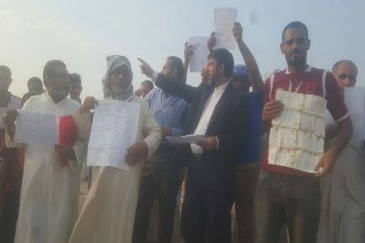Dozens of Ahwazi farmers held a demonstration in front of the headquarters of Iran’s state sugar cane refinery firm, the Amir Kabir Company, between the regional capital Ahwaz and Muhammarah on Friday August 25 to protest against its illegitimate confiscation of over 1,000 hectares of agricultural land.
The farmers from two villages in the Ismailia region, Al-Shemria and Tel-Aswad , produced documents proving their ownership of the land totalling over 1,000 hectares which was seized by the state-owned firm for sugar-cane farming with no warning, legal justification or compensation.
Representatives of the firm clashed with protesters after regime security forces threatened the demonstrators with arrest if they failed to leave the area around the entrance to the headquarters building.
The state-owned IRNA News Agency reported on the protest, saying that the farmers asked regime officials to intervene to retrieve the land illegally stolen by the sugar refining company.
The farmers’ spokesman Hussein Morammazi told IRNA that the farmers, who were growing rice on their land, had been shocked to find bulldozers sent by the sugarcane company appearing with no warning or notification a few days ago, destroying their crops, with regime officials claiming ownership of the land. The farmers produced documents proving their ownership of the confiscated land, which their families had been farming for generations.
The state-owned Amir Kabir sugar refinery company, formed in 1990 by a parliamentary decree, has confiscated at least 80,000 hectares of agricultural land in northern Ahwaz province from farmers there since its foundation, seizing 12,000 hectares to the south of the regional capital on the banks of the Karoon river in 2012 alone, IRNA reported.
While the Iranian regime makes huge profits from the environmentally devastating oil and gas industries in the Ahwaz region (where over 90 percent of the oil and gas claimed by Iran is located) and dedicates massive areas to sugarcane farming, whose environmental effects are similarly catastrophic, the Ahwazi people are effectively unofficially banned from working in these industries, with the jobs instead being given to settlers of Iranian ethnicity, who live in specially constructed settlements provided with amenities denied to Ahwazis who are treated as fifth-class citizens.
In recent months, many Ahwazis in rural areas have killed themselves by public self-immolation in despairing protest at the regime’s systematic persecution, which has led to massive unemployment and desperate poverty.
For Ahwazi Arab population, as for the Kurdish and Baluchi minorities, racist discrimination and socioeconomic deprivation are the norm, with the Iranian regime’s policies towards Ahwazis strongly resembling those of apartheid South Africa towards black peoples. Ahwazis are denied the most basic rights, including the right to publicly speak their own language – Arabic – and to wear their own traditional Arab garments. In education and employment, discrimination is standard, with Ahwazis, like other minorities in Iran, relegated to a second-class people even in their own lands. Of the top 20 Iranian cities for unemployment in 2013, seven were in Arab majority areas, seven in Baluchi areas, four in Iranian Kurdistan and only two in Persian-majority areas.
Despite the fact that over 90 percent of the oil and gas resources claimed by Iran are located in the Ahwaz region, the Ahwazi people are denied any share in the profits from their own resources and live in conditions of often medieval poverty.Meanwhile, the regime encourages non-Arabs to move to the region to work in the oil industry, effectively as colonizers, where they live in some luxury in walled-off, ethnically homogeneous settlements built especially for them, where Ahwazis are forbidden from living, and provided with all the facilities which the indigenous Ahwazis are denied, resulting in a two-tier society in which Ahwazis are relegated to an inferior class.
The ‘civilized’ Western world which supposedly frowns on such horrendous injustice and withholding of human rights has not only failed to condemn the Iranian regime’s grotesque, apartheid-style abuse of Ahwazis and other minorities in Iran, but has given it a seal of approval, with Obama’s recent ‘legacy’ deal with the theocratic regime opening the way for many international organizations and oil companies to do business with the regime and welcome it into the international community.
